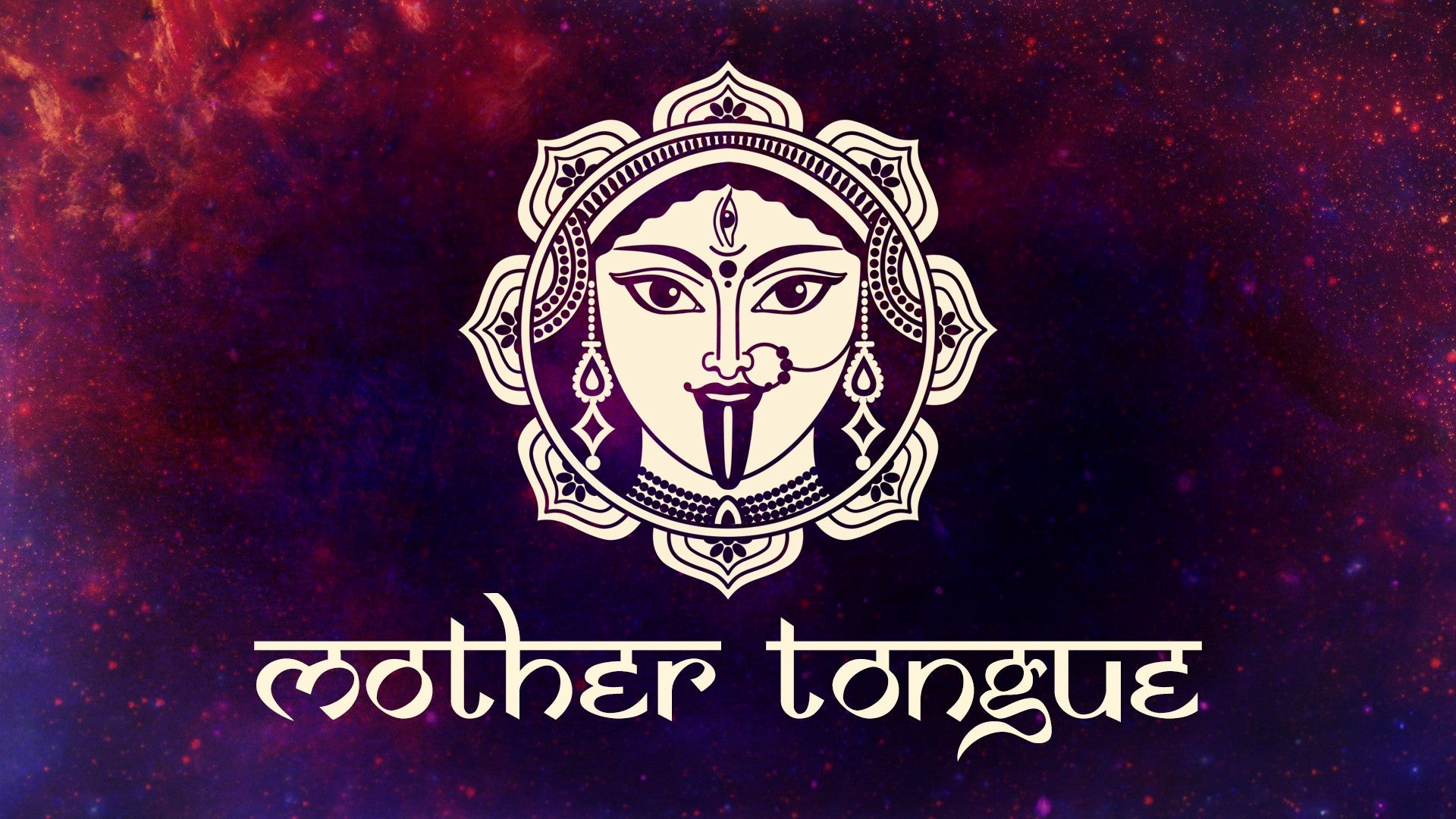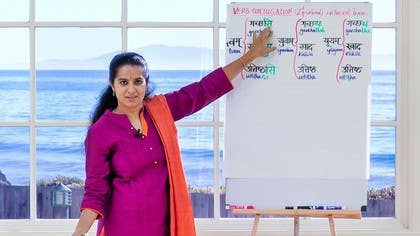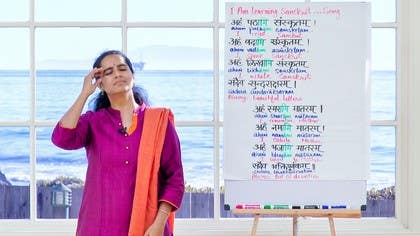Description
About This Video
Transcript
Read Full Transcript
Namaste dear friends. So by now you're getting a little familiar with how the Sanskrit verbs are conjugated. We looked at it in the present tense with a third person singular, dual and plural as well as in the you formal which is the second person formal singular, dual and plural. We've also seen the actions and associated the verb conjugation with the second person informal. What we will do next is to look at what the script of those words are like. So when we talk of you informal we know it's the tham, say that tham, two of you remember it's you and then vam, you vam. The vam was two people and then it's you, the second person case. So you vam, very good and when it's many of you it was a yum yum case. So it's you yum, you yum, got that? So now when the tham associates itself with the verb we have to conjugate the verb with the ending see. So tham gachasi means you informal go. Tham gachasi, say that tham gachasi, tham gachasi. We have the verb khad which would become tham khad the see to eat, you eat. So tham khad the see, you said it right. And if it has to be you stand, uttishta, so tham uttishta see, that's it. Lovely, so tham gachasi, tham khad the see, tham uttishta see. Now you say that tham gachasi go, you go, you eat, tham gachasi, you get up, tham uttishta see. Very nice. Now we'll keep the tham aside because the very fact of saying gachasi tells us that you in the singular informal are doing the action. The code is right in the see. So we'll just say gachasi, khad the see, eat, get up, stand, uttishta see. Lovely. So now let's move on to the dual. And in the dual we see that it is you too is uvam, you too go, uvam, gacha, taha, call that gacha, taha. Just remember that when we spoke of those two people going, it was gacha, taha, with the non aspirate the, dental the sound, gacha, taha. When we add it with the second person informal you too, it becomes gacha, taha. Add the aspirated sound to it, gacha, taha. Now let's see it with the verb khad to eat. So the two of you eat will be khad, taha. Very good, khad, taha. khad, taha. Lovely. You too, stand, uttishta, taha. Very good, uttishta, taha. The sir needs to have the gap there otherwise it can be confused with the letter here which is very similar but doesn't have a rounded head and the line goes all the way through. Like we have the uvam, you see this is the year where the line goes straight over the head and there is no rounded top there. Whereas with the th there is a slightly rounded top then there is a gap there and the line continues after that. So uttishta, taha. Yeah, there we are. So let's say that, I say it once and you repeat after me but think of it. So, uvam, you too go, uvam, gacha, taha. Lovely. You too eat, uvam, khad, taha. Very good. You too, stand up, uvam, uttishta, taha. Lovely. So we'll say it once together, uvam, gacha, taha. uvam, khad, taha. uvam, uttishta, taha. Lovely. We move on to the plural now and in the plural you will notice that it becomes gacha, taha. We've already practiced saying it earlier when we had the demonstration session. Right now when we look at it we see that the thing that is missing is the two dots at the end. That gives it the extra aspirated sound. So we hold that back. So, uvam, all of you, gacha, taha. Got that? Uvam, gacha, taha. You all go. You see when everybody goes, suddenly there's a thoh. I'm trying to remember that so it's like gacha, taha. Great. You all eat would be uvam, khad, taha. Lovely. Khad, taha. Lovely. And then uyam, stand. All of you stand. Uttishta. Lovely. Uttishta, tah. Uttamam.
Excellent. We have that. Clear? So let's revise it. I'll say it once for you and you repeat after. Uyam, gacha, taha. You all go. You all eat. Uyam, khad, taha. Lovely. You all stand up. Uyam, uttishta, taha. The verb uttishta, taha can also mean wake up. So sometimes verbs have many meanings depending on the context. Right. So gacha, taha, khad, taha, uttishta, taha. The last one needs a little bit of awareness regarding your breath because it's uttishta, taha. You see it's a very natural pranayama that you do when you speak Sanskrit. That's the beauty of speaking this language. I would really invite you to explore the joys of speaking this language and feeling its benefits shrink or rather not shrink, feeling its benefits enter your system. Yeah. So practice along. Do you want to just say it once together? We'll just do it with the verb gacha tsi. All right. We just say it with the verbs. So gacha tsi, gacha, taha, gacha, taha. We'll just add the pronoun with it. See you in the next session where we'll practice the first person in the singular dual and plural. So stay tuned and see you soon again.
Mother Tongue: Verbs
Comments

You need to be a subscriber to post a comment.
Please Log In or Create an Account to start your free trial.








